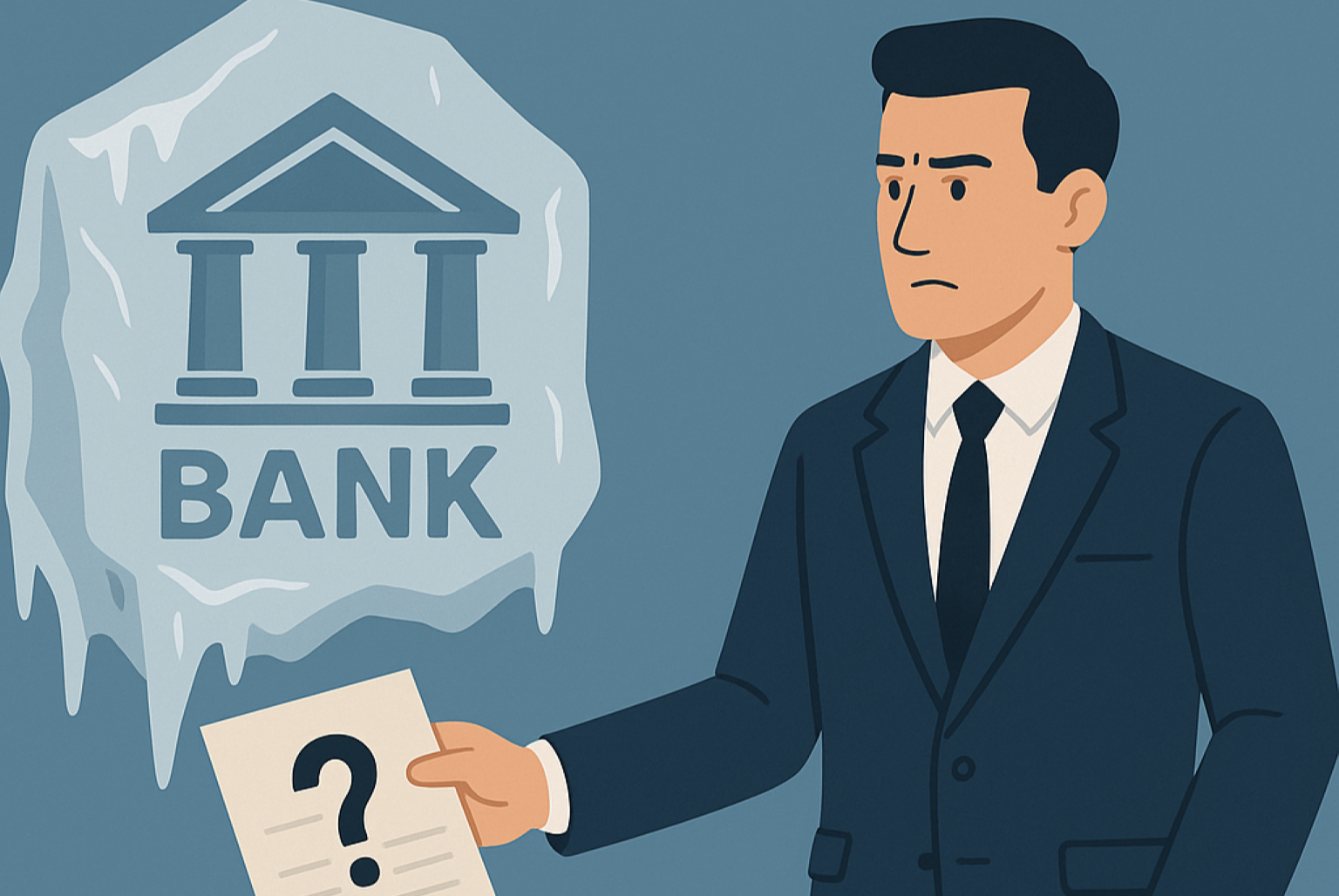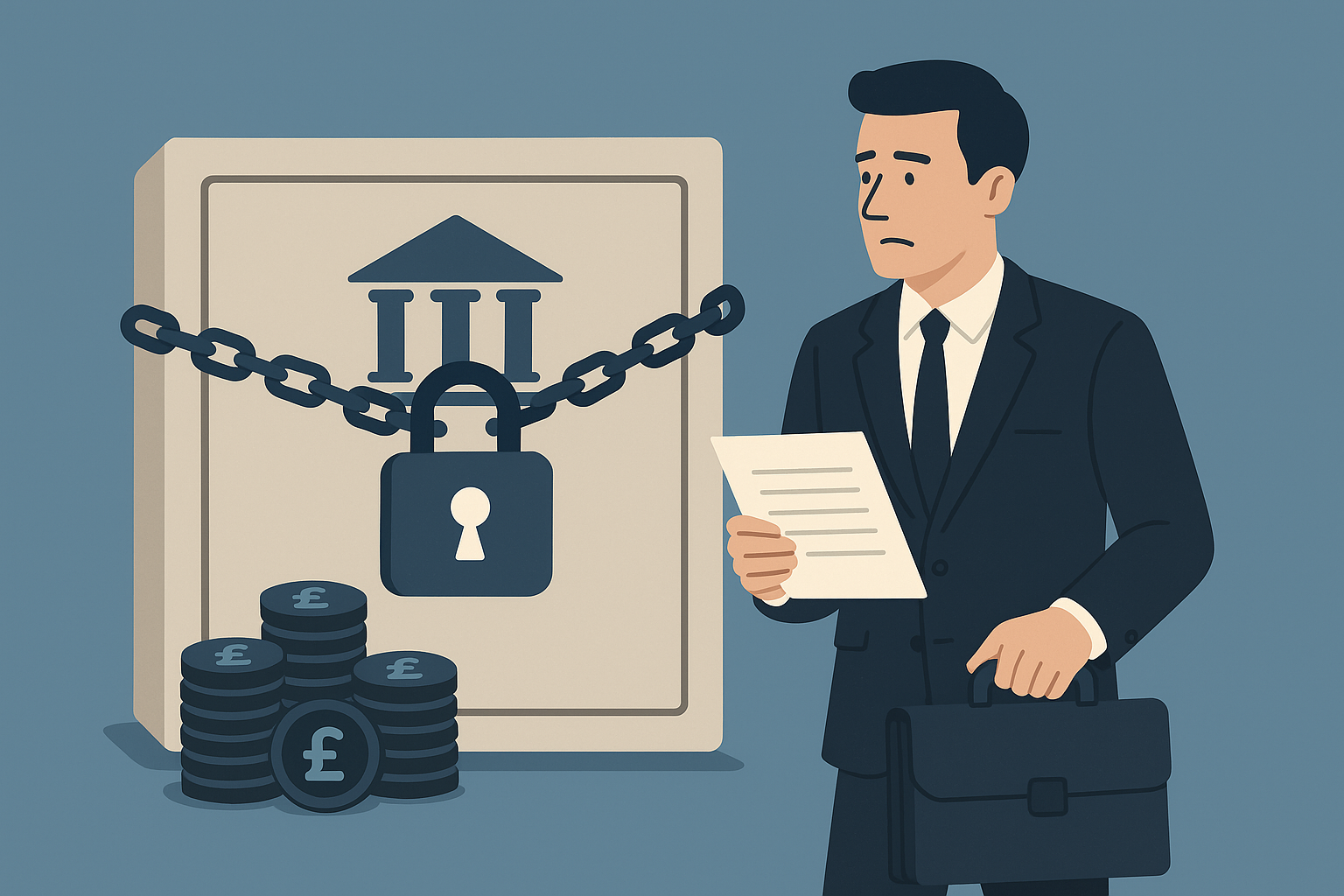Discovering that your bank account has been frozen without warning can be a distressing and disruptive experience. Frozen bank account advice is essential if your bank suddenly restricts access to your funds without explanation.
Why Frozen Bank Account Advice Matters
Whether you’re unable to access personal savings or critical business funds, understanding your legal options is the first step to resolving the issue.
In many cases, banks freeze accounts due to concerns about suspicious activity, regulatory compliance, or pending legal action. Regardless of the underlying cause, a lack of clear explanation can be incredibly stressful and leave you feeling as though you are navigating the situation blindly. That is why it is essential to understand both your legal rights and the steps you can take to resolve the issue. With the right information and support, you can challenge the freeze and regain access to your money.
Our team outlines the legal options available to you if your account has been frozen without a clear reason, from initial contact with your bank to potential court proceedings. Taking prompt and informed action is key to resolving the situation and restoring access to your funds.
1. Contact Your Bank Immediately
As soon as you discover that your account has been frozen, your first step should be to contact your bank without delay and request a clear explanation for the freeze. While banks are sometimes restricted in what they can disclose, particularly if the freeze is linked to a suspicious activity report or an ongoing investigation, they are generally obliged to confirm that a freeze has occurred and advise you on any procedural steps you need to take.
Document every call or meeting with the bank. Record names, dates, and summaries of each conversation. Keeping written records can help if you escalate the issue or involve a solicitor. Quick, clear communication often leads to faster outcomes.
2. Provide Information and Supporting Evidence
If you believe that the account freeze is a result of an error or stems from legitimate activity that has been misinterpreted, it is important to gather and present relevant documentation as soon as possible. This may include bank statements, transaction records, business invoices, contracts, or correspondence that clearly demonstrates the lawful nature of the transactions in question.
Providing this evidence to your bank in a clear and organised manner can help clarify the situation and show that the activity triggering the freeze was justified and legal. If the bank is satisfied with the information provided and the appropriate supporting documents, they may decide to lift the freeze and restore your access to funds.
Always keep a copy of what you send. Ask the bank to confirm in writing that they received your documents. Fast, organised action improves your chances.
3. Submit Written Request
Send a formal letter to your bank. Explain the freeze, what steps you’ve taken, and include your evidence. In all cases, you should request a timeline for review and the anticipated resolution. If the bank delays or fails to respond, or you find the response unsatisfactory, contact a manager or compliance officer.
4. Get Frozen Bank Account Advice from a Solicitor
Consult a solicitor experienced in dispute resolution.
A litigation solicitor can:
- Represent your interests in discussions with the bank and any other relevant authorities;
- Help you collect and present any necessary evidence;
- Advise on your rights and the best strategy to implement for unfreezing your account; and
- If the freeze is linked to a legal order (such as an Account Freezing Order), your solicitor can apply to the court to vary or discharge the order, or to release funds for essential expenses.
5. Court Options for Frozen Bank Account Cases
You can challenge a freeze if it was imposed by a court order or government action, such as an Account Freezing Order under the Proceeds of Crime Act 2002, you have the legal right to challenge it. In such cases, you can apply to the Magistrates’ Court to vary or discharge the order. This process involves submitting a formal application and presenting evidence to support your request.
The court will consider whether the continued freeze is proportionate and justified based on the available facts. If you are experiencing financial hardship, you may also request partial access to the frozen funds for essential living costs or to cover legal expenses. To be successful, you will need to provide clear and compelling justification, such as proof of monthly bills, rent or mortgage payments, and other necessary expenditures. Legal representation is essential when pursuing this route, as it can significantly improve your chances of a favourable outcome.
6. Pursue a Legal Action If Necessary
If you believe and your solicitor advises that the freezing of your bank account is unlawful or or unreasonable, you can file a legal claim. This typically involves issuing a claim in the County Court or High Court, depending on the complexity and value of the case. Your solicitor would be able to assess the circumstances and advise you whether there is a viable cause of action, such as a breach of contract, negligence, or a violation of your rights under financial regulations.
While litigation can be time-consuming and costly, it may be the most effective course of action where informal resolution efforts have failed and the freeze has severely affected your financial stability. If the court finds the freeze to be unjustified, it can order the account to be unfrozen and, in some cases, award compensation for any financial losses suffered.
7. Temporary Restraining Order or Bankruptcy (for debt-related freezes)
If a creditor judgement caused the freeze, you may qualify for a temporary restraining order or payment plan. Filing for bankruptcy can also suspend debt collection efforts and unfreeze accounts, allowing time to develop a financial plan.
If your account is frozen and you need urgent help, we can assist. Timely legal advice can be crucial in protecting your assets and resolving the issue efficiently. An experienced solicitor can help you understand your legal rights, navigate the complexities of the situation, and guide you through the necessary steps to restore access to your funds.







